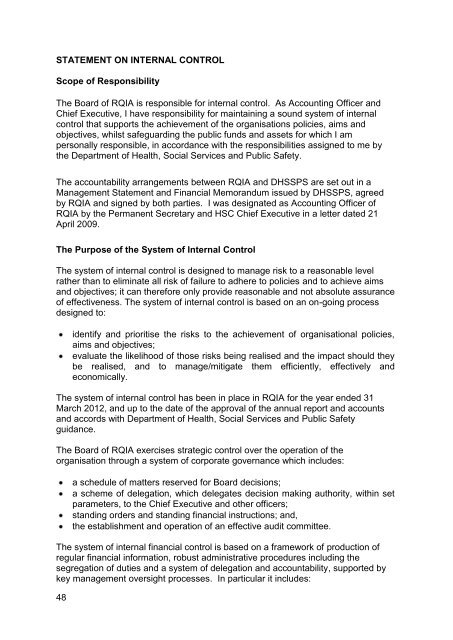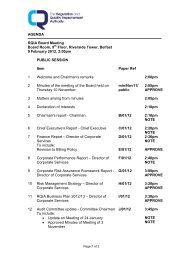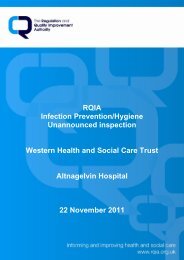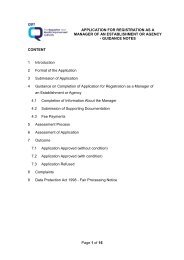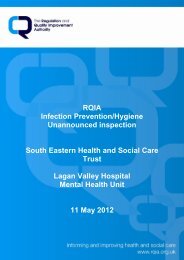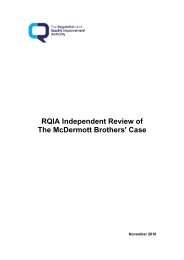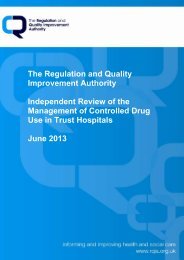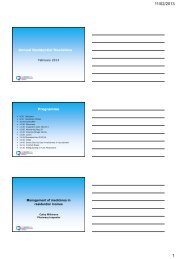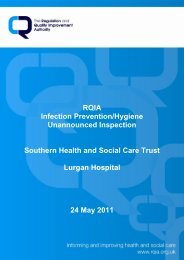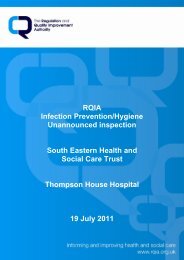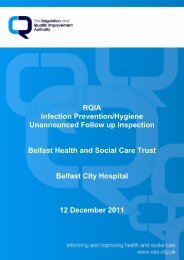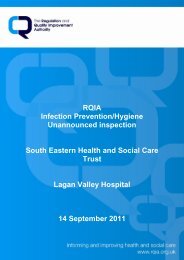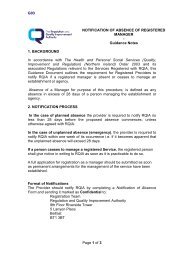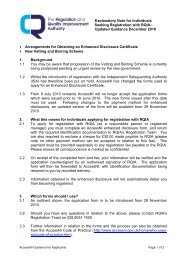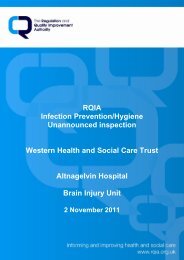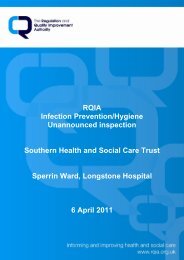RQIA Annual Report & Accounts 2011-12 - Regulation and Quality ...
RQIA Annual Report & Accounts 2011-12 - Regulation and Quality ...
RQIA Annual Report & Accounts 2011-12 - Regulation and Quality ...
Create successful ePaper yourself
Turn your PDF publications into a flip-book with our unique Google optimized e-Paper software.
STATEMENT ON INTERNAL CONTROL<br />
Scope of Responsibility<br />
The Board of <strong>RQIA</strong> is responsible for internal control. As Accounting Officer <strong>and</strong><br />
Chief Executive, I have responsibility for maintaining a sound system of internal<br />
control that supports the achievement of the organisations policies, aims <strong>and</strong><br />
objectives, whilst safeguarding the public funds <strong>and</strong> assets for which I am<br />
personally responsible, in accordance with the responsibilities assigned to me by<br />
the Department of Health, Social Services <strong>and</strong> Public Safety.<br />
The accountability arrangements between <strong>RQIA</strong> <strong>and</strong> DHSSPS are set out in a<br />
Management Statement <strong>and</strong> Financial Memor<strong>and</strong>um issued by DHSSPS, agreed<br />
by <strong>RQIA</strong> <strong>and</strong> signed by both parties. I was designated as Accounting Officer of<br />
<strong>RQIA</strong> by the Permanent Secretary <strong>and</strong> HSC Chief Executive in a letter dated 21<br />
April 2009.<br />
The Purpose of the System of Internal Control<br />
The system of internal control is designed to manage risk to a reasonable level<br />
rather than to eliminate all risk of failure to adhere to policies <strong>and</strong> to achieve aims<br />
<strong>and</strong> objectives; it can therefore only provide reasonable <strong>and</strong> not absolute assurance<br />
of effectiveness. The system of internal control is based on an on-going process<br />
designed to:<br />
48<br />
identify <strong>and</strong> prioritise the risks to the achievement of organisational policies,<br />
aims <strong>and</strong> objectives;<br />
evaluate the likelihood of those risks being realised <strong>and</strong> the impact should they<br />
be realised, <strong>and</strong> to manage/mitigate them efficiently, effectively <strong>and</strong><br />
economically.<br />
The system of internal control has been in place in <strong>RQIA</strong> for the year ended 31<br />
March 20<strong>12</strong>, <strong>and</strong> up to the date of the approval of the annual report <strong>and</strong> accounts<br />
<strong>and</strong> accords with Department of Health, Social Services <strong>and</strong> Public Safety<br />
guidance.<br />
The Board of <strong>RQIA</strong> exercises strategic control over the operation of the<br />
organisation through a system of corporate governance which includes:<br />
a schedule of matters reserved for Board decisions;<br />
a scheme of delegation, which delegates decision making authority, within set<br />
parameters, to the Chief Executive <strong>and</strong> other officers;<br />
st<strong>and</strong>ing orders <strong>and</strong> st<strong>and</strong>ing financial instructions; <strong>and</strong>,<br />
the establishment <strong>and</strong> operation of an effective audit committee.<br />
The system of internal financial control is based on a framework of production of<br />
regular financial information, robust administrative procedures including the<br />
segregation of duties <strong>and</strong> a system of delegation <strong>and</strong> accountability, supported by<br />
key management oversight processes. In particular it includes:


